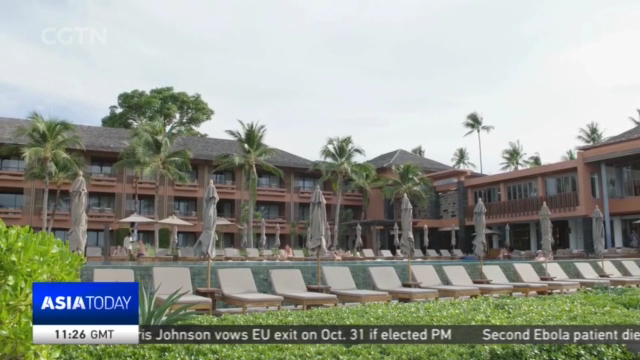
20:13, 13-Jun-2019
Crackdown on Hotel Industry: Increase of illegal hotels causing havoc in Thailand
Updated
17:30, 09-Jul-2019

Thailand is a top tourist destination. With 41 million tourists projected to enter the country this year, the hotel industry will no doubt get a boost. But an increase in illegal hotels is wreaking havoc on the industry. Thailand's Hotels Association claims that around 60-percent of hotel rooms are operating illegally and are robbing legal hotels of their livelihood. Our correspondent Dusita Saokaew explains from the Thai island of Koh Samui.
Thailand, the land of a thousand smiles, is constantly named as one of the best countries for traveling, a title, the country owes largely to its burgeoning hotel industry.
With a genuine need to protect this lucrative industry, comes an inevitable opportunity for many to exploit. The rise of illegal or unregistered hotels throughout the country, particularly at popular island outposts, is causing concern for Thailand's tourism body as it becomes nearly impossible to regulate.
SUPAWAN TANOMKIEATIPUM DIRECTOR, THAI HOTEL ASSOCIATION "40% are registered as licensed hotel, and another 60% are not licensed hotels. As the Thai Hotel Association we are very concerned about this. Whenever we have oversupply, there will always be a price war happening."
It is estimated that of more than 18,000 hotels in the country, only 8,000 are registered. That leaves more than 10,000 hotels that are operating illegally.
DUSITA SAOKAEW KOH SAMUI "Legal hotels pay taxes and license fees while facing competition from un-registered hotels that undercut rates. It doesn't sound like much of a problem for visitors who are keen to lap up the sunshine and enjoy the island's famous beaches. Without proper licensing, these unofficial hotels also lack proper safety and regulation."
Koh Samui is attracting millions of visitors to its golden beaches and turquoise seas each year and local authorities are under pressure to tackle this issue. Crackdowns and raids happen often, but with the estimated number of illegal hotels in the thousands on this island alone, it's become an uphill battle.
PANYA UDOMSAK DEPUTY DISTRICT CHIEF, SAMUI DISTRICT "From the hotels raided, 30-40% have been illegal. It's very difficult to control as these hotels are scattered all around the island and we have limited law enforcement."
Under the Hotel Act, illegal hotels include serviced apartments, guesthouses, condominiums, and other private properties available for short term rent to tourists. Airbnb, lies in the grey area and has ultimately become the face of the issue- considered illegal in Thailand, the law has, so far, been lightly enforced.
PANYA UDOMSAK DEPUTY DISTRICT CHIEF, SAMUI DISTRICT "It's difficult for these hotels to stop operating. We need to change the law so that it reflects the current situation as the travelling trend has changed."
While the government wrestles with how best to regulate, the stacks are high for island tourist towns. Because as tourist numbers increase, the number of new hotels, both registered and unregistered, that enter the market, naturally follows suit.
Dusita Saokaew, CGTN, Koh Samui, Thailand.
SITEMAP
Copyright © 2018 CGTN. Beijing ICP prepared NO.16065310-3
Copyright © 2018 CGTN. Beijing ICP prepared NO.16065310-3